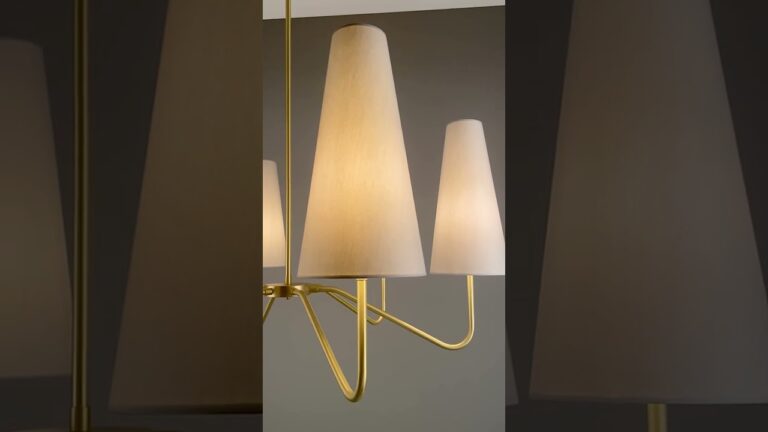In the world of interior design, crafting natural elements into lighting fixtures has become a popular trend. From sleek wooden pendant lights to delicate shell sconces, incorporating elements from the natural world adds a touch of organic beauty to any space. In this article, we will explore how designers are using natural materials to create stunning and unique lighting pieces that bring a sense of warmth and tranquility to homes and businesses alike.
Advantages
- Unique and custom designs: Crafting natural elements into lighting allows for the creation of unique and custom designs that can add a personal touch to any space.
- Eco-friendly: Using natural elements such as wood, bamboo, or rattan in lighting fixtures promotes sustainability and reduces the environmental impact of traditional lighting materials.
- Warm and inviting ambiance: Natural materials in lighting can create a warm and inviting ambiance, adding a touch of nature to indoor spaces and enhancing the overall atmosphere.
Disadvantages
- Limited availability of natural elements: Some natural elements used in crafting lighting fixtures, such as driftwood or unique stones, may be difficult to find in large quantities, limiting the production of these items.
- Fragility: Lighting fixtures made from natural elements can be more fragile and prone to damage compared to those made from synthetic materials, making them less durable in the long run.
- Environmental impact: Harvesting natural elements for crafting lighting fixtures can have a negative impact on the environment, especially if not done sustainably or ethically.
- Higher cost: Crafting lighting fixtures from natural elements can be more expensive due to the limited availability of materials and the time-consuming process of handcrafting each piece. This can make these items less accessible to a wider range of consumers.
What defines a biophilic environment?
A biophilic environment is a space that incorporates elements of nature to enhance the well-being and productivity of those who inhabit it. By integrating natural materials, vegetation, and views of the outdoors, biophilic design seeks to create a connection between people and the natural world.
This design approach not only improves mental and physical health, but also fosters a sense of calm and inspiration in the built environment. With an emphasis on sustainability and human well-being, biophilic environments can transform spaces into vibrant and harmonious settings that promote creativity and overall well-being.
What are the three pillars of biophilic design?
Biophilic design incorporates three key pillars: nature in the space, natural shapes and forms, and natural patterns and processes. By integrating these elements into architectural and interior design, spaces can evoke a deep connection to nature, promoting health and well-being. The first pillar, nature in the space, involves incorporating elements such as plants, water features, and natural light to bring the outdoors inside and create a sense of tranquility. The second pillar, natural shapes and forms, focuses on utilizing organic shapes and materials inspired by the natural world to create a harmonious environment that appeals to our innate connection to nature.
The third pillar of biophilic design, natural patterns and processes, emphasizes incorporating elements like fractals, biomimicry, and natural textures to create a sense of visual interest and complexity. By following these three pillars, designers can create spaces that not only look aesthetically pleasing but also contribute to improved mental and physical well-being. Ultimately, biophilic design seeks to create environments that support our innate connection to nature, fostering a sense of calm, creativity, and overall well-being.
What are the downsides of biophilic design?
Biophilic design, while promoting a connection to nature, can also be expensive to implement and maintain. The incorporation of natural elements such as plants and water features requires ongoing care and maintenance, which can be costly and time-consuming. Additionally, the use of natural materials can also be less durable and more prone to wear and tear, leading to potential replacement and repair costs down the line. Despite its many benefits, it’s important to consider the potential drawbacks of biophilic design, especially in terms of budget and long-term maintenance.
Illuminating Beauty: Transforming Nature into Light
Step into a world where nature’s beauty is transformed into a mesmerizing display of light. From the gentle glow of fireflies dancing in the night to the vibrant hues of a sunset painting the sky, nature’s brilliance is captured and magnified in stunning ways. Each beam of light serves as a reminder of the intricate and awe-inspiring beauty that surrounds us, illuminating our world with a touch of magic.
Through the art of illumination, nature’s raw beauty is elevated to new heights, creating a captivating spectacle that leaves us breathless. The interplay of light and shadow transforms ordinary landscapes into extraordinary works of art, showcasing the hidden wonders of the natural world. As we bask in the radiant glow of this transformed beauty, we are reminded of the power and majesty of nature, forever captured in the flickering dance of light.
Radiant Creations: Nature-Inspired Lighting Designs
Radiant Creations offers a stunning collection of nature-inspired lighting designs that will illuminate any space with beauty and elegance. From delicate floral motifs to organic shapes and textures, each piece is carefully crafted to bring the splendor of the natural world into your home. With a focus on quality materials and innovative design, our lighting fixtures will not only brighten your space but also serve as works of art that will captivate and inspire all who behold them. Experience the transformative power of Radiant Creations and let nature’s beauty shine in every corner of your home.
Crafting natural elements into lighting fixtures not only adds a touch of elegance and uniqueness to any space, but also promotes sustainability and environmental consciousness. By utilizing materials such as wood, stone, and metal in innovative ways, designers are able to create stunning pieces that not only illuminate a room, but also serve as works of art. Incorporating these natural elements into lighting design allows for a seamless blend of functionality and beauty, providing a harmonious and eco-friendly lighting solution for any interior design project.



